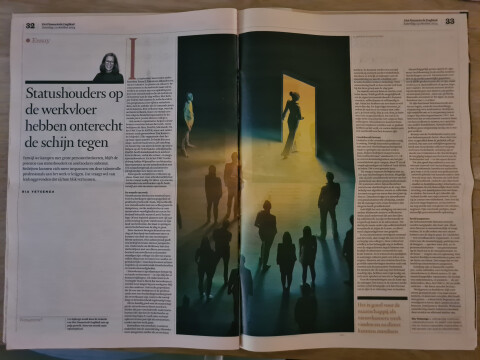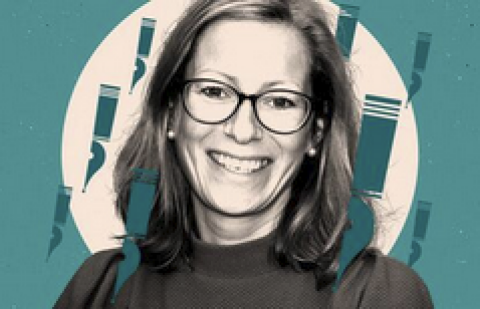
December 20th 2024
Status holders in the workplace are wrongly given the impression
- Status holders
- Asylum seekers
- Labor market
While we are struggling with major staff shortages, the potential of status holders and asylum seekers remains untapped. Companies can make more of an effort to get these talented professionals to work. This does require managers to broaden their horizons, writes Ria Yetsenga.
In September, grid operators TenneT, Enexis and Alliander launched a new initiative. Instead of competing with each other in the search for talent, they are working together on a training programme for status holders who want to work as technicians or fitters. Together with Refugee Talent Hub, the grid operators are starting a programme for fifteen status holders, with the ambition to expand this in the coming years. A welcome step, because according to industry organisations, the technology, construction and energy sectors are looking for 50,000 new colleagues in the coming years .
Other organisations also help newcomers find work quickly. Large companies such as Ikea , PostNL , Microsoft , NS , the UMCG and the ANWB , but also entrepreneurs such as greengrocer Ton Kanters in Schijndel . Each organisation does it in its own way. For example, Ikea offers an internship, including a language course, job coaching and mentoring to help newcomers find their way in the Dutch labour market. PostNL employs status holders and asylum seekers, often as sorting and warehouse employees. And at the UMCG, surgeon Arthur Wijsmuller set up a small-scale programme to allow status holders with a healthcare background to enter as assistant nurses.
These good initiatives deserve applause. But with our labor market shortages, more is needed. There are 150,000 status holders and asylum seekers sitting on the bench , while 400,000 vacancies are open.
Missed opportunities
Newcomers offer a huge opportunity. Many refugees are highly educated or practically trained. For example, a status holder with a background in data privacy, strong analytical and communication skills and a master's degree in Law & Technology obtained in the Netherlands. Or a logistics planner with five years of work experience in large warehouses in his country of origin, who is eager to get started in the Netherlands.
These people bring knowledge and experience from their home countries and can solve part of our vacancy problem. Their backgrounds give a company and teams new perspectives. Research by McKinsey shows that companies with a diverse workforce are more successful and future-proof: colleagues in diverse teams complement each other and innovate faster and easier. As a result, they can better respond to changing customer needs and market conditions.
Newcomers are also eager to learn and loyal employees – they are happy to contribute. Research in the United States showed that newcomers stay with an employer three times longer than others. This dedication and commitment also regularly recur in the conversations I have with companies and the professionals with a refugee background who work there.
'It is good for society if newcomers find work and can participate immediately'
It is good for society if newcomers participate immediately. Earlier this year, research agency SEO concluded that Dutch society would gain almost €2 billion in additional prosperity in ten years if asylum seekers started working earlier.
Moreover: those who participate are more actively part of society. Newcomers integrate faster if they have a job. They build a social network faster and learn Dutch faster. They do this while contributing to society and the treasury: after all, workers pay taxes. Our society therefore benefits enormously from this group getting to work.
The value of a job is enormous, for every person. Work gives you the opportunity to provide for your own livelihood, to be self-reliant and independent. But having a job is much more than that. The day is structured, you practice the language and there is contact with colleagues: you belong. Whatever you do, you learn something new and grow through it. And what I learned most of all in my work: it increases their self-respect. Newcomers can tell their children at home what they have done at work, and feel that they can be an example to them again.
Insufficiently aware
Despite all these advantages, too little is happening. While thousands of professionals with a refugee background are eager to get to work, companies seem stuck in their search for 'standard CVs'. Or they recruit knowledge migrants to fill the staff shortage, by bringing in IT specialists or nurses from India or South Africa. This is a missed opportunity.
The question is why companies do not think more about refugees. They may not be sufficiently aware of the potential of this group of professionals. For example, HR systems are an obstacle to recruiting refugees. They use algorithms to reject applicants with a gap of more than two years on their CV. As a result, a newcomer receives an automated rejection, without the manager being aware that the person has applied.
It also remains a challenge to apply for a job with a different sounding name. Amin Asad experienced this first-hand: after his law studies, he applied in vain for jobs in the legal profession. Until he changed the name under his application letter to Arjan de Leeuw, and was immediately invited for an interview .
Once a newcomer is at work, this also requires commitment and understanding from colleagues. Due to cultural differences, it is important to be aware of the unwritten rules within a company or unconscious prejudices on both sides . For example, not looking at someone is a sign of respect in some cultures. People from more hierarchically oriented societies often have to get used to the proactive Netherlands. And people who do not yet fully master the language need more time to express themselves or to understand something.
It is important to be aware of this and take it into account for the expectations of the manager, the team and the new employee.
Inhibiting factors
Socially, the general image in the media surrounding refugees plays a role. Newcomers are hardly portrayed in the media as the professionals they are, but often in a victim role or in a negative way. Most people do not immediately think of professionals with potential when they think of refugees, but of political discussions and tents in Ter Apel. As a result, they are 1-0 behind.
There are also restrictive laws and regulations, such as the work permit for asylum seekers. Companies are required to apply for such a permit from the benefits agency UWV. This means that they have to make extra efforts to hire them, compared to other candidates. Status holders do not need a permit to be allowed to work.
Knowledge of the Dutch language is also an impediment. But this barrier has been specifically created by politics itself. Only with a residence permit does a newcomer officially have access to Dutch lessons. Fortunately, there are more and more initiatives that help refugees learn the Dutch language at an early stage - and that opens doors.
Finally, the lack of a relevant network is a problem for many refugees. They do not (yet) have the informal channels and recommendations that you and I can use from our professional network. For example, Hussam from Syria, despite his completed studies in business informatics and economics and a considerable amount of work experience, took several years to find a job. It was only when I shared his story with my network on LinkedIn that he came into contact with Rabobank. He was able to start an internship there, and he still works there with great pleasure as a robotics engineer. Great for both parties, but of course not a structural solution.
'A society in which everyone participates makes us all stronger.'
Talent for the taking
These inhibiting factors need to be addressed, that much is certain. But none of this is insurmountable or unsolvable. There is every reason to get started with newcomers. The benefits – a more agile organisation, €2 billion extra for society, participating citizens – speak for themselves, and the staff shortages – from the greengrocer on the corner to the energy transition and construction – require a solution. So companies need to start seeing newcomers as a source of talent. That requires us to change the image of newcomers.
Fortunately, there are financial arrangements , such as subsidies for employers who hire newcomers. There are social organizations that support companies, and pioneers – the grid operators, Ikea, the UMCG, NS and all those others – who show that it is possible.
Employers and companies: for new staff, also look at newcomers, and come up with a plan. It doesn't have to be big - you can start small, and then learn, adjust and expand. Dare to dream big. Because a society in which everyone participates, we all become stronger.

Ria Yetsenga is an independent communications professional. She works for companies and social organizations in the field of newcomers and asylum – including Refugee Talent Hub.
This essay was published in the Financieele Dagblad on Saturday 19 October 2024. The essay can also be read online via the FD website .